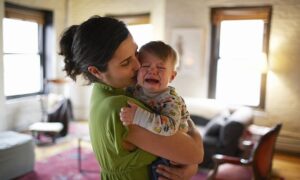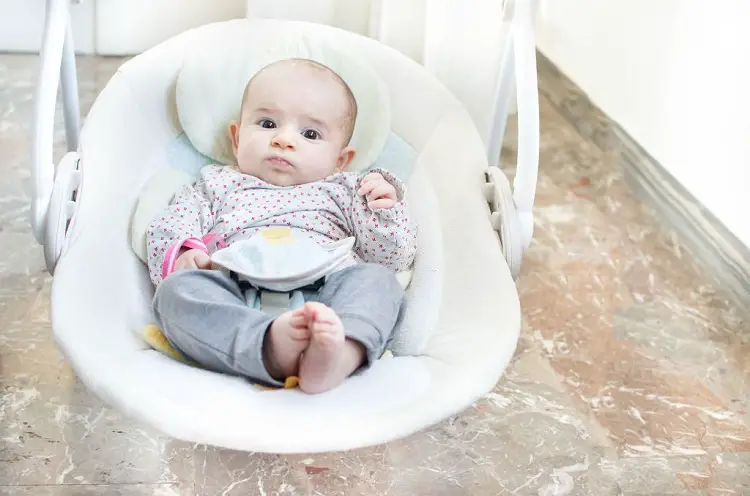Have you seen a baby fuss or feel uncomfortable or even cry while kept in a bouncer chair, and then you think aloud oh! Baby hates bouncer chair.
Does your baby seem to scream or cry when kept on a bouncer chair, and then you think that your baby hates bouncer chair.
Even though babies can’t hate, they can certainly be uncomfortable, and they will let you know, no matter what you may have planned for them.
Regardless of how much you pay for that bouncy seat, if your baby doesn’t like it, they won’t use it. Don’t be annoyed.
This article discusses why your baby hates bouncer chairs and tips to help you cope with them.
Why Do Babies Hate Bouncer Chair
Action and reaction are equal and opposite, says Newton’s third law of motion, and in practical life experience, it could translate that there is no reaction without an action that prompted it.
So for your baby to hate a bouncer chair, there should be reasons why your baby hates bouncer seat or is constantly fussy when in a bouncer seat.
Some of the reasons why your baby may have developed a hatred for this could be:
1. Over-Simulation
While in the womb, your baby is unaware of the hustle and bustle of the world, and sometimes after birth, coming to terms with the reality of the happenings around them might be difficult.
Too much noise, movements, and even visual stimulation might be sources of over-stimulation to your baby when strapped in a bouncer chair.
If your baby is over-sensitive, the scenario playing out for them might make them uncomfortable and cry.
In this case, your baby may not be upset or uncomfortable due to the strapping to a bouncer’s chair, but instead to the over-stimulating situation before him, which has become too much for his sensitive nature.
2. Your Baby Feels Lonely
Loneliness might also be why your little one is uncomfortable when strapped on a bouncer chair.
Your baby might have become used to having company, and then suddenly he realizes that it is no longer business as usual.
Your baby realizes that the usual routine of having someone holding him during his waking hours has become a thing of the past.
Your baby realizes that the constant body contact you both share has been relegated to the background since introducing a bouncer chair.
All these might make your baby uncomfortable with the idea of a bouncing chair and then not knowing how to register his displeasure.
The baby may end up crying, which is the only way to draw your attention to realize that he is uncomfortable on the bouncer chair.
3. Your Baby is Uncomfortable
Sometimes, your baby may hate the bouncer seat because it limits his activity.
Your baby may not be at home with the idea of being strapped and kept at a place, feeling constrained to a particular spot.
As parents, your baby’s safety should be your topmost priority, so do not lose any strap to make your baby comfortable.
Ensure that all manufacturers’ instructions are obeyed to the latter and that all straps and fasteners are snug and secure without cutting your baby’s skin.
4. Fussy Nature of baby
Sometimes displeasure or dislike for a bouncer’s chair may result from your baby’s personality.
Your baby’s personality might be one that he dislikes being held at a place, and once this is done, displeasure is shown.
Once your baby has a fussy nature, then your baby coming to terms with the bouncer chair might be a little bit difficult.
5. Baby is Premature or Colicky
One common thing to babies birthed prematurely, and some colicky babies are their extra sensitiveness to light, noise, and movement.
This unique trait or characteristic in them makes them repulsive to the use of bouncer chairs.
6. The Baby Has Motion Sickness
Your baby may be fussy because he’s feeling car sick. While motion sickness is generally more common in toddlers and older children than infants, some babies still experience it.
Read: When To Put Baby in Bouncer
Baby Hates Bouncer Chair: Tips To Help Your Baby Cope

Fortunately, you can do a few things to help soothe your baby while in the bouncers. These things include
Settle Your Baby First
Avoid putting your baby into a bouncer, car seat, or stroller when he’s already fussing or uncomfortable.
Try to wait until he is calm and happy before attempting to place him in, as he will only become angrier (and louder!) when you put him in.
Calm Your Baby Down While Keeping Him Distracted
Before you try to strap your baby into a bouncer seat or car seat, put him on his back on a play mat, a blanket on the floor, or in his crib.
Then play with some sounds (from your mobile phone or white noise) or use some toys to keep your baby calm and engaged.
Once you notice your baby is calm and relaxed, you should try and put him into the bouncer or seat.
Keep Your Scent Close
Your baby may fuss in a bouncer because they want to be close to you. Babies learn their parents’ scents and want to know they are close by at all times.
If this is the case, we recommend keeping that comforting, familiar scent near the baby by placing a shirt that mom or dad have worn so that they can smell your presence.
Try a Change of Scenery
Your baby might be comfortable in the bouncer chair if he has a better view.
If your child enjoys seeing his reflection in the mirror, you might want to position the bouncer near a mirror or attach toys to his car seat so he can admire them and play with them.
If your baby has a problem with his car seat, try strapping him in at home and playing with him while he’s in it so he starts to feel more comfortable (and happier) when he’s strapped in.
Stay Insight
If you believe your baby is struggling because he cannot see you, keep a close eye on him, talk to him, and touch him if that helps.
Talk, sing, or play with him in the backseat if you’re not driving. These little things could provide just the comfort he needs to relax.
Sling Him Up
If he craves closeness to you, carry him in a sling or other carrier that keeps him near you as possible.
Even though you’ll be toting a little sidekick wherever you go, you’ll have your hands free to take care of other things while wearing your baby.
Do not wear your baby in the car, however. No matter how uncomfortable your baby gets, he should be in his car seat when you’re driving.
Will My Baby Ever Stop Hating Bouncer Chair?
The answer to your question is YES. Your baby sure will stop hating bouncer chairs as they grow.
While your baby grows, they gradually come to terms with the reality of the world they found themselves in.
Once your baby has gotten to this stage of acceptance, your baby stops being fussy when placed in a bouncer chair, and the crying bouts they display will become a thing of the past whenever they are put in a bouncer chair.
Though some babies may never come to terms with using a bouncer chair, they would never warm up to it.
If your baby persistently shows displeasure with the bouncer chair, you need to stop.
When Will Baby Stop Hating Bouncer Chair?
Your baby will stop hating bouncers as they grow and come to terms with the reality of their environment.
Babies tend to cry and show their discomfort during the first three months of their lives.
Once they start approaching the 4th month, they gradually become conditioned to tolerate things that used to cause them pains and displeasure before.
This is for babies that will outgrow their phobia or hatred for bouncer chairs.
Read Also: How To Fold Baby Einstein Jumper For Storage
Other Frequently Asked Questions
Do bouncers delay development?
Bouncers encourage babies to stand on their tiptoes but can delay your baby from walking if they use it a lot.
Extended use of baby carriers and seats in reclining seats, or chairs that prop your baby in a sitting position, can delay a child’s ability to sit up independently.
Can bouncy chairs cause shaken baby syndrome?
No. It is recommended you support infants’ heads at all times. Caregivers should refrain from jostling them or throwing them in the air.
However, gentle bouncing, swinging, or rocking will not cause the shaken baby syndrome.
Do bouncers help baby walk?
Bouncers can help the baby walk by strengthening, stretching, and building a baby’s legs in preparation for crawling and walking.
It gives the baby a sense of balance without the risk of falling. Another benefit is that the movement and exercise can stimulate your baby’s mind and provide her with plenty of entertainment.
Which is better, a bouncer or walker?
The popularity of baby walkers is controversial for a good reason: they make babies more mobile than is expected of them from parents.
Bouncers are stationary and therefore considered safer to use on smaller babies.
Read Also: MamaRoo Vs RockaRoo Vs BounceRoo – Which is Better?
Wind Up
I hope this article has provided in-depth knowledge to answer the question of “baby hates bouncer chairs”?
The reason your baby may not be at home with the idea of using a bouncer chair has been discussed above.
If you wonder if your baby will later accept a bouncer chair, the answer is yes and no. Time will tell.
Babies tend to cry and show their discomfort during the first three months of their lives, and once they start approaching the 4th month, they gradually become conditioned to tolerate things that used to cause them pains and displeasure.
This is for babies that will outgrow their phobia or hatred for bouncer chairs, so if your baby gets to the fourth month and is still uncomfortable using them, you have to stop trying.
